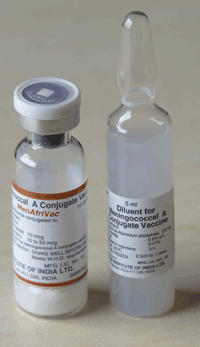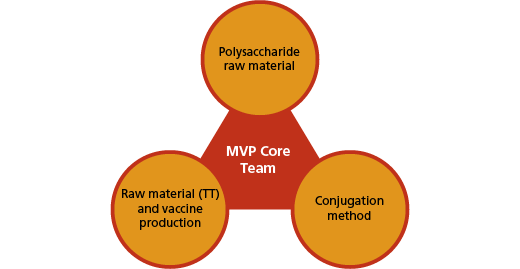Developing a meningococcal A conjugate vaccine
Consortium model leads to affordable, custom vaccine
The new meningococcal A conjugate vaccine is expected to eliminate group A epidemic meningitis in Africa. |
To develop an affordable and effective vaccine, MVP first focused on understanding the constraints that had limited the introduction of new vaccines in Africa. The team consulted with African public health officials, who emphasized vaccine price as a key barrier and indicated that a cost of more than US$0.50 per dose would be unsustainable. This ceiling price became the key driver in negotiations.
Finding the right players …
MVP analyzed the costs of constructing the manufacturing capacity, process development, and clinical and regulatory activities for licensure of a meningococcal A conjugate vaccine for use in Africa. Then the project investigated two approaches: (1) subsidizing a vaccine manufacturer in the United States or Europe for the costs of development in return for the right to purchase a low-price vaccine; or (2) purchasing raw materials, developing the conjugation process, and transferring the technology to a developing-country manufacturer for large-scale production and low-price sale of vaccine.
When it became clear that no vaccine manufacturers in the developed world could produce a meningitis A conjugate vaccine at less than US$0.50 per dose, MVP focused on the second approach and, after extensive due diligence, identified:
- Suppliers of group A polysaccharide and tetanus toxoid, the two main components of the conjugate vaccine (Synco Bio Partners in Amsterdam, the Netherlands, and Serum Institute of India Ltd [SIIL] in Pune, India).
- A research laboratory that was willing to develop and transfer a conjugation technology (Center for Biologics Evaluation and Research of the U.S. Food and Drug Administration [CBER/FDA] in Bethesda, Maryland).
- A vaccine manufacturer who could accept the technology transfer and was willing to make a conjugate vaccine that would cost less than US$0.50 per dose (SIIL).
The conjugation technology was transferred to SIIL in December 2003, and in 2004 SIIL prepared test lots and clinical batches of the study vaccine using the CBER/FDA technology. Animal testing, including toxicity, local tolerance, and immunogenicity of the study vaccine was completed in 2004, and the first MVP clinical trial was launched in 2005.
… for the right target
The consortium offers an alternative model for vaccine development where a key raw material comes from one source, the technology from another, and the final scale-up for production from yet another. Moreover, it includes a north-to-south transfer of technology and capacity.
MVP brings together the different partners and components needed to develop the meningococcal A conjugate vaccine. |
In addition to a low vaccine cost, this model offers additional advantages including, first, a focused effort on developing a single product, avoiding the distraction of competition with higher value projects that inevitably would occur if the vaccine were manufactured by an established vaccine company in the United States or Europe. Secondly, rather than adapting an existing product or technology developed for use in premium-priced markets, the model allows creation of a custom-made product for Africa. For example, the meningitis A conjugate vaccine is formulated in ten-dose vials containing preservative, which is best suited for mass immunization campaigns but which has limited use in industrialized countries.
Photo: Monique Berlier.


